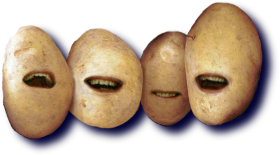

Tuesday, 27 April 2004
A Strange Tale
From The Feminine Monarchie, Or A Treatise Concerning Bees and the Due Ordering of Them (1607) comes this amusing little anecdote:
A certaine ſimple woman having ſome ſtals of Bees which yeelded not vnto her hir deſired profit, but did conſume & die of the murraine; made hir mone to another woman more ſimple then hir ſelfe: who gaue her councel to get a conſecrated hoſt or round God amighty and put it among them. According to whoſe adviſe ſhe went to the prieſt to receiue the hoſt: which when ſhe had done, ſhe kept it in hir mouth, & being come home again ſhe tooke it out and put it into one of hir hiues. VVherevpon the murraine ceaſed, and the hony abounded. The woman therefore lifting vp the hiue at the due time to take out the honie, ſawe there (moſt ſtrange to be ſeene) a chappel built by the Bees with an altar in it, the wals adorned by marvelous ſkil of architecture with windowes conveniently ſet in their places: alſo a dore and a ſteeple with bels. And the hoſt being laid vpon the altar, the bees making a ſweet noiſe flew round about it.
Not content to simply include the tale, and apparently afraid it might not be instantly believed, the author then went on to defend it from any criticism he thought it might receive:
But whether this doe more argue the ſupernatural knowledge and ſkil of the Bees, or the miraculous power of the hoſt, or the ſpiritual craftines of him, whose comming is by the working of Satan with al power and ſignes and lying wonders, it may be ſome wil make a queſtion: and preſuming to examin every particular circumſtance over narrowly, wil make obiections againſt the truth of the ſtory: which, by their leaues, in the behalfe of my author I muſt not ſpare to anſwere. Firſt it may be they will obiect that the hoſt being held ſo long in the womans mouth could not chooſe in that ſpace but melt and marre. Indeed, if it did remaine, as it was, a wafer-cake, this were likely enough: but being turned into fleſh it is an abſurd aſſertion. If they ſhal ſay that becauſe, it was now honi-harveſt, at which time good ſtals, ſuch as this was, are ful of wax and hony, that therfore there could not be roome enough for a chappel with a ſteeple and bels in it; I anſwere that this is as weake and ſimple as the former. For ſeeing it is knowne that a blacke ſmith of London did make a locke and key ſo little that a flie could draw it; why ſhoulde not the little ſmith of Nottingham (whoſe art is thought to excel al art of man) frame a little chappell in a litle roome? But then perhaps they wil reply, if we grant you this, howe then could the Bees flie about the altar in that little chappel, ſeeing they are not able to flie in ſo narrow a roome as the empty hiue? As for that, it may be a miſtaking of a word: happily the woman ſaid they did but crawle. If they ſhal aſke how the woman could ſee the altar with the hoſt ſtanding in the chancel & the bels hanging in the ſteeple, ſeeing the waxen wals were not tranſparent, they maie eaſilie thinke that the Bees woulde giue their dame leaue to looke in at the windowes. And if they ſhal ſay that thoſe bels being made of ſuch metall would giue but a weake ſounde when they were runge to matins; they muſt conſider the pariſhioners dwelt not far of. And ſo I thinke theſe captious criticks wil hold themſelues ſatiſfied.
Methinks the author doth protest too much. He follows up with another story, which he defends by saying that if it had been made up, the deviser "might haue made his tale more probable." In other words, because it sounds so ridiculous, it must be true!
Posted by godfrey (link)
Comments
Hey- I remember when you showed that to me on microfische at the library! That was a nice day we spent together!
ME
ME